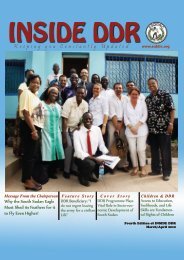Examining Enterprise Capacity - SSDDRC
Examining Enterprise Capacity - SSDDRC
Examining Enterprise Capacity - SSDDRC
Create successful ePaper yourself
Turn your PDF publications into a flip-book with our unique Google optimized e-Paper software.
A larger problem for the communities of Southern Sudan, according to the official, is the tension felt<br />
towards Northerners. During the war, Northerners were considered enemies and these attitudes do<br />
not change easily. Terms such as Jelaba and Jur are used to describe outsiders – the first having<br />
been associated with Northern merchants accused of stripping Southern resources. Patience and<br />
education are needed to move from hate to acceptance. At one time, Help Age had set-up an eyeclinic<br />
in Yay, but the local community there would not allow doctors from Khartoum to serve them.<br />
Tension between Southern communities also exists and is a great concern.<br />
The Help Age senior official believes that income-generation projects can bring people together and<br />
ease community conflicts, but too often it isolates groups due to the narrow focus of target<br />
communities. Transparency in any project is important, as experiences differ from location to<br />
location, community to community and project to project. On the topic of remittances, the official<br />
stated that there are some remittances being received in Juba; however, it does not appear to be<br />
substantial enough to support the livelihoods of much of the community.<br />
The Swiss Foundation for Mine Action (FSD), Juba<br />
In Juba, the researchers met with members of the Swiss Foundation for Mine Action (FSD), the NGO<br />
charged with de-mining and training Sudanese nationals in such activities. Their work is focused in<br />
Southern Sudan and Darfur and is an important part of the DDR program.<br />
One member of the team stated that in the Juba area, FSD had hired 120 ex-combatants for demining.<br />
Of these 120, over 60 were fired due to alcoholism problems. 81 new recruits were recently<br />
hired from returnee populations, mainly those returning from Ugandan and Kenyan refugee camps.<br />
The official stated that the refugees are better educated than the ex-combatants and are less likely<br />
to show up for work inebriated. Interestingly, there is widely available documentation that large cash<br />
payments are often misused by ex-combatants, as they are not accustomed to managing funds and<br />
may be more likely to abuse drugs and alcohol.<br />
FSD members noted that the mandate given to them by the UN is to clear roads for UN activities and<br />
to open Juba to different markets – both to Khartoum and East Africa. There is no intention to demine<br />
farmland so that people can return to sustainable forms of livelihoods. The official who<br />
commented on this stated that the responsibility to de-mine farmland would be left to Sudanese<br />
national, and that these activities would not likely start for ten to fifteen years. An official at the UNDP<br />
was able to confirm this statement.<br />
The United Nations (UN), Juba<br />
The researchers met with two UN staff members, one from the UNDP and one working with UNMIS<br />
(Southern Sudan) who has UNDP and Ministry of Justice (Southern Sudan) experience. Both are legal<br />
officers with vast experience with issues pertaining to DDR, governance, gender, government<br />
capacity building and human rights. One is a foreign national and the other a Sudanese national.<br />
Land tenure and inheritance were raised as important legal issues pertaining to development in<br />
Southern Sudan, especially for women. Communal land is shared and under the authority of tribal<br />
leaders, almost always men. Property itself can be purchased, giving legal and economic rights to an<br />
owner, where communal land faces many political and economic challenges. With current<br />
inheritance customs, cattle, an important factor of wealth, does not go to women. Thus, women in<br />
Southern Sudan, especially the large group of marginalized IDP women, are very concerned with their<br />
potential for economic development. Access to markets is also a large retardant of the economic<br />
development of women. Conflict exists between Dinka IDPs who are using agricultural land for<br />
grazing their cattle and other IDPs interested in raising crops. Exacerbating this issue are Mulas,<br />
militias involved in cattle raiding from competing tribes. Chiefs of returning IDP communities do not<br />
26


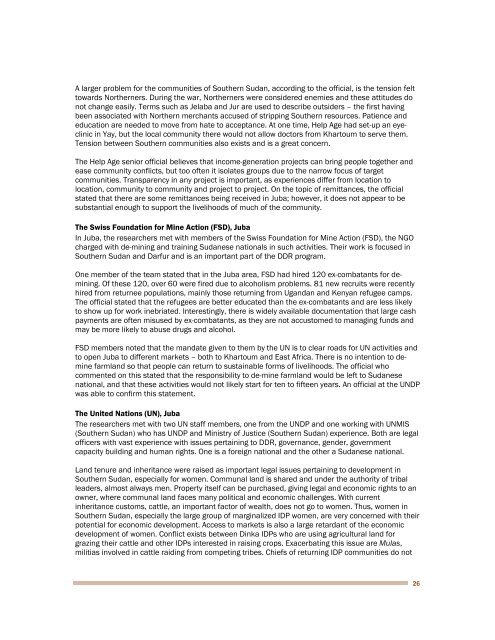
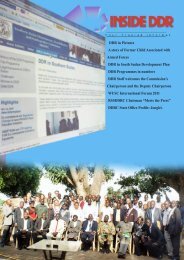
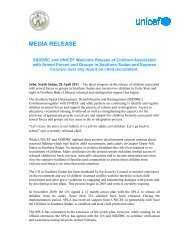
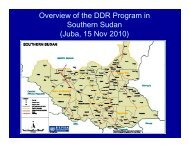
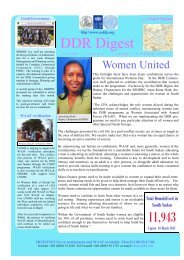
![Download here [975KB] - Republic of South Sudan DDR Commission](https://img.yumpu.com/10592740/1/184x260/download-here-975kb-republic-of-south-sudan-ddr-commission.jpg?quality=85)
